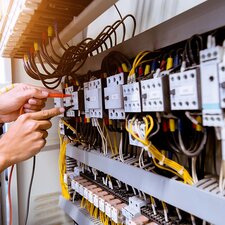crwdns2862637:0crwdne2862637:0
crwdns2869081:0crwdne2869081:0
HP EliteBook 725 G3 Frequently Overheats Troubleshooting
Your HP EliteBook gets hot to the touch often and makes loud humming noises when it does. Follow these steps to fix the problem.
Blocked Cooling Fan
Possible causes of this would be dust and debris build up or blocked air vents that can be caused by using your device on a bed, blanket, pillow, or your lap. Otherwise, the problem may be the fan itself needs replacing. We have created a guide that will provide all of the steps necessary to remove the old fan and install a new one.
Unnecessary Background Programs Running
Having too many tabs open can cause overheating as the laptop is continuing to run any applications that remain open in the background. If you are experiencing overheating, please consider first closing out any unnecessary tabs or programs that do not need to be open at that time. This can cause an overload on your HP EliteBook's CPU and saturate your RAM. You are basically overworking your laptop and not giving it enough time to catch its breath.
Performance Settings
Your laptops performance settings directly influence how much work your CPU does, which in turn affects the amount of heat produced. As we know from physics, work and heat are directly related. High performance mode prioritizes the speed at which your laptop performs tasks, to prevent any lag. However, this in turn generates significantly more heat than at a lower base frequency. The HP EliteBook 725 G3 has its own system cooling policy setting as well. If yours is set to active, then cooling is prioritized and your system begins to run fan speeds at higher speeds sooner. This explains the loud humming noise coming from your laptop.
Outdated Drivers
Outdated drivers can cause inefficiencies that increase the workload and hinder the system's ability to regulate heat. Outdated drivers can contain bugs or lack optimizations that newer drivers have implemented. Because of the increased inefficiency, the CPU takes on a higher workload to achieve the same result. More work means more power consumption and therefore more heat generated. Inaccurate sensors in the drivers may delay internal cooling systems and may cause even more damage to your motherboard.
Blocked Air Vents
Restricted air flow directly chokes the system's ability to regulate heat. When the intake vents are blocked, by blankets/pillows/etc., the fans cannot draw in enough cool, fresh air. This immediately affects the efficiency of the system to cool itself down. In turn, the exhaust being blocked can trap the heat inside of the laptop. When these air vents are blocked, it can cause your system to be forced to work at higher temperatures on a daily basis which can damage your laptops internal components.

crwdns2944067:00crwdne2944067:0